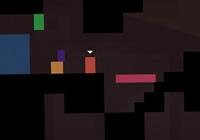Thomas Was Alone (Wii U) Review
By Joseph Walsh  03.02.2015
03.02.2015

Part platformer, part puzzler, part pretty at times, part indie; at its very core, Thomas Was Alone is a game about physics and feels like a one-to-one lesson on how to create platform games using just squares, rectangles and polygons. Nothing too dissimilar to games of the past then, except what makes this title a little different to those before it is the way each character's - or shape's - story is narrated as they journey across treacherous lands in their attempt to escape from the unnerving pixel cloud. Is Thomas Was Alone a welcome addition to the Wii U eShop's indie library, though, or does it fall flat at the first hurdle?
Upon first glance, Thomas Was Alone may look like nothing more than a simple platform game, where the main aim is to guide a square block towards its designated goal. However, delve a bit deeper and it becomes apparent that this isn't a simple case of jumping and running through stages, as much effort has gone into making this a slightly more thought-provoking blend of physics- and puzzle-based gaming.
Of course, what makes this different is not only the mechanics but also the way the story of Thomas is narrated throughout. It's an interesting take on a game that is essentially about shapes and is a humorous attempt to add substance and identity to the least interesting looking characters yet to be seen anywhere.
Thomas Was Alone, or at least, he was for the first level of the game, but as the game goes on, Thomas encounters different shapes, each with their own story and more importantly, move sets - some characters can jump high, others are small enough to fit through small gaps, whilst one has the ability to float in water and serves as a boat to help the less able shapes get from one side to another. It's with this focus on using different physics and abilities that the game opens up and makes gamers think outside the metaphorical box.

Figuring out how to use each character's ability to help themselves and others is both fun and engaging, and hearing the narrator try to explain each polygon's selfish and revenge-filled reason for trying to make it to the end before others, only adds to the quirky nature of the game. Ironically, however, it is sometimes the game's main strengths that lead to its weaknesses. As it tries to marriage an assortment of gaming styles together, it unfortunately never really excels in either department and feels like being left facing an identity crisis. As a platform game, it never really finds its rhythm, mainly due to the amount of stopping, starting and frequent insistence on having to switch shapes, just to climb a few steps.
As a puzzle game, it's just too easy and is likely to be tackled within four-to-five hours. It's a shame that the first few hours and stages are all too simple, as it feels more like an extended training session before venturing into the more challenging aspects. There are moments of real genius and, at times, Thomas Was Alone feels as though it has discovered its comfort zone, but these moments are too few and far between, and yet, to its own credit, will leave people wanting more. In typical indie fashion, the visuals are deliberately minimal - nice, clean, to the point and relevant to the developer's play on shapes with outrageously intricate plotlines. However, with such a minimalistic approach to visual design, it can be genuinely taxing to remember what storyline applies to each character when there are five similarly-shaped individuals on screen at any one time, with each one tackling their own problem, whilst the player is busy selecting each one, trying to ensure their survival.

Cubed3 Rating
Very Good - Bronze Award

The best thing about Thomas Was Alone is that it dares to try something new and isn't afraid to merge a variety of character physics amongst a couple of different gaming components. It might not capture the essence of the games it was originally inspired by, but by challenging those very genres and adding ideas of its own, it may well become a focal point in indie development, inspiring developers to create games in a similar vein.

![]() 7/10
7/10
![]() 0
(0 Votes)
0
(0 Votes)
 Out now
Out now  Out now
Out now  None
None  Out now
Out now Comments
Comments are currently disabled

 Sign In
Sign In Game Details
Game Details Subscribe to this topic
Subscribe to this topic Features
Features






 Top
Top

